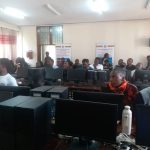
Dr. Fred Kaggwa
RESEARCH INTERESTS
At the faculty, Quality Assurance avails monitoring and evaluation and other services to the institutions like providing; information on what an intervention is doing, how well it is performing and whether it is achieving its aims and objectives; guidance on future intervention activities; an important part of accountability to funding agencies and stakeholders. Monitoring is a regular collection of information about all Faculty activities. It shows whether things are going on as per plan and helps departmental, Faculty Deans, and other stake holders like; students, lecturers and other administrators, to identify and solve problems quickly.
At FCI, the QA domain keeps track of all activities, facilities/resources, behavior, and performance such as: staff & student conduct, staff & student attendance and performance, staff & student research, grant writing, LMS usage, examination moderation and supervision monitoring, industrial training, programme development and reviews, course conduction and governance, status of facilities of convenience such as toilets, library status, mentorship programs and all support services to both staff and students.
Quality Assurance at the Faculty of Computing and Informatics
QA team at the Faculty is composed of 3 the heads of departments, 1-member representative at each department, 3 heads of units, a representative from the Dean’s Office (Faculty Administration), and the Chairperson; Making it a total of 11 members.
The committee generates reports on a quarterly basis which are submitted to the Faculty Administrator as well as University Wide Quality assurance office for review.
‘Succeed We Must’
2013-2016: PhD Computing, Mbarara University of Science and Technology, Uganda
2009-2011: MSc. Computer Security, Universiteit Twente., Netherlands
2004-2007: Bachelor of Computer Science (Honors), Mbarara University of Science and Technology, Uganda
Interests are in Data Science, Health Informatics, Computer Security Related areas including: Network Security, Forensics Science, Computer Ethics, Biometrics Security, Privacy, Hardware & Software Security, and Security in Organizations.
- Paik, K.E., Hicklen, R., Kaggwa, F., Puyat, C.V., Nakayama, L.F., Ong, B.A., Shropshire, J.N. and Villanueva, C., 2023. Digital Determinants of Health: Health data poverty amplifies existing health disparities—A scoping review. PLOS Digital Health, 2(10), p.e0000313.
- Kalungi, D., Ejiri, A. H., Kaggwa, F., & Kawuma, S. (2023). Requirements for the Development of an Ontology-Based Model for Efficient and Effective Delivery of Career Guidance: A Case of South-Western Uganda. European Journal of Science, Innovation and Technology, 3(1), 224-237.
- Tumuhimbise, W., Atwine, D., Kaggwa, F., & Musiimenta, A. (2023). Acceptability and feasibility of a mobile health application for enhancing public private mix for TB care among healthcare Workers in Southwestern Uganda. BMC Digital Health, 1(1), 1-11.
- Kalungi, D., Ejiri, A.H., Kaggwa, F. and Kawuma, S., 2023. A Systematic Review on the Application of Ontologies to Improve Career Guidance.
- Ntwari, R., Habinka, A. E., & Kaggwa, F. (2022). Enhancing Bring Your Own Device Security in Education.
- Nakato, R., Kituyi, M. G., & Kaggwa, F. (2022). Ethical Climate: Analyzing the Moderation Effect on Cardinal Virtues and Employees’ Cyber Security Ethical Behavior Intention in Ugandan Commercial Banks. European Journal of Technology, 6(2), 49-61.
- Ntwari, R., Habinka, A. E., & Kaggwa, F. (2022). BYOD Systematic Literature review: A layered approach. European Journal of Technology, 6(1), 69-85.
- Nakato, R., Kituyi, M. G., & Kaggwa, F., (2022). Establishing the Influences of Cardinal Virtues on Employees’ Cyber Security Ethical Behavior in the Banking Sector in Uganda. European Journal of Technology, 6(1), 1 – 13. https://doi.org/10.47672/ejt.896
- Tumuhimbise, W., Atwine, D., Kaggwa, F., & Musiimenta, A. (2022). Enhancing tuberculosis care in southwestern Uganda: Facilitators and barriers to utilizing mobile health technologies. Global Implementation Research and Applications, 1-11.
- Mpangwire, V., Ejiri, A. H., & Kaggwa, F. (2020). Technological Factors and Adoption of the Unified Identification System (UIDS) Among Government Ministries, Departments and Agencies (MDAs) In Uganda; A Quantitative Perspective.
- Mpangwire, V., Habinka, A. E., & Kaggwa, F. (2020). Environmental Factors: Examining the Analytical Power of Its Dimensions in Explaining the Adoption of a Unified Identification System of MDAs in Uganda. International Journal of Electronic Government Research (IJEGR), 16(4), 58-72. http://doi.org/10.4018/IJEGR.2020100104
- Mpangwire, V., Ejiri, A., & Kaggwa, F. (2020). Organisational Factors and Adoption of the Unified Identification System (UIDS) Among Government Ministries, Departments and Agencies (MDAs) In Uganda. American Journal of Data, Information and Knowledge Management, 1(1), 1-11.
- Kimera, Richard, Fred Kaggwa, Rogers Mwavu, Robert Mugonza, Wilson Tumuhimbise, Gloria Munguci, and Francis Kamuganga. “Mbarara University of Science and Technology (MUST).” In Leveraging Data Science for Global Health, pp. 329-350. Springer, Cham, 2020.
- A. Izaara, R. Ssembatya and F. Kaggwa, “An Access Control Framework for Protecting Personal Electronic Health Records,” 2018 International Conference on Intelligent and Innovative Computing Applications (ICONIC), Mon Tresor, Plaine Magnien, Mauritius, 2018, pp. 1-6.
- F. Kaggwa, J. Ngubiri and F. Tushabe, “Combined feature level and score level fusion Gabor filter-based multiple enrollment fingerprint recognition,” 2016 International Conference on Signal Processing, Communication, Power and Embedded System (SCOPES), Paralakhemundi, Odisha, India, 2016, pp. 159-165. IEEE, 2016, ISBN: 978-1-5090-4620-1
- Fred Kaggwa, John Ngubiri and Florence Tushabe. Article: Gabor Filter-based Multiple Enrollment Fingerprint Recognition. International Journal of Computer Applications 139(7):32-38, April 2016. Published by Foundation of Computer Science (FCS), NY, USA
- Kaggwa, Fred, John Ngubiri, and Florence Tushabe. “Improving recognition performance in multiple enrollment based fingerprint recognition systems.” In Computer & Information Technology (GSCIT), 2015 Global Summit on, pp. 1-5. IEEE, 2015, ISBN: 978-1-4673-6586-4
- Kaggwa, F.; Ngubiri, J.; Tushabe, F. Multiple enrollment based Fingerprint Recognition Systems: State of the Art Survey. IJCIT Volume 04-Issue 02, March 2015 [Online]. Available: http://www.ijcit.com/archives/volume4/issue2/Paper040240.pdf
- Kaggwa, Fred; Ngubiri, John; Tushabe, Florence, “Evaluation of Multiple Enrollment for Fingerprint Recognition,” IEEE Computer & Information Technology (GSCIT), 2014 Global Summit on , pp.1-6, 14-16 June 2014, ISBN: 978-1-4799-5626-5










